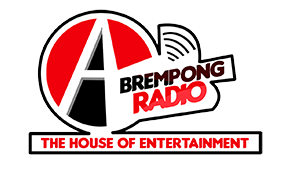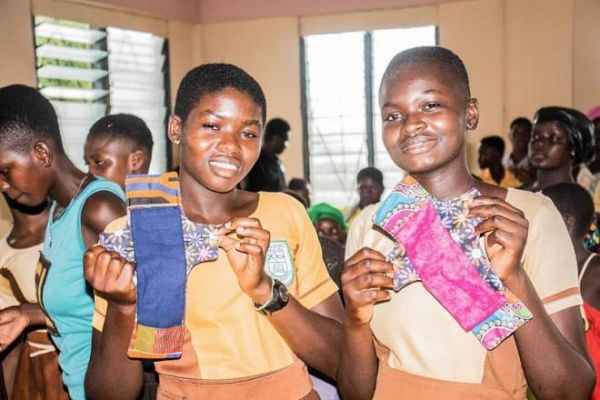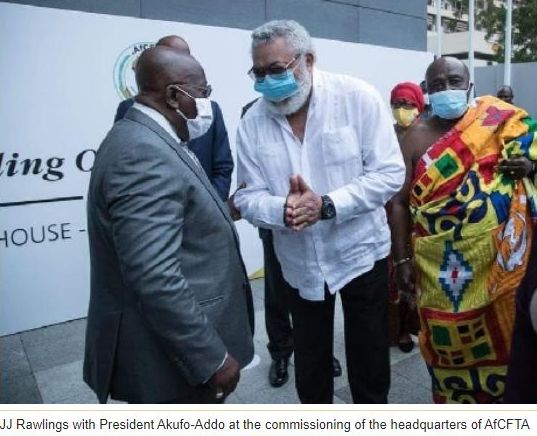Plan Ghana Introduces Washable, Reusable Sanitary Pads
In that vein, a Non-Governmental and Humanitarian Organization (NGO), Plan International Ghana as part of its efforts to ensure that no girl child is left behind in acquiring sustainable education has introduced washable and reusable sanitary pads for school going adolescent girls in its areas of operations.
The very hygiene, durable and environmentally friendly and locally produced pads which have a five-year lifespan thus replaces the regular type of plastic sanitary pads which through Faytex International they were providing for school going children in their project communities.
This innovation has been highly received with joy by menstruating girls and their parents in their catchment areas in the Eastern, Central and Volta Regions of Ghana and were made from scientifically approved cotton fabrics or textiles.
In all Plan Ghana intends to provide 2,000 pieces of these pads to school girls that are menstruating in selected communities in the Regions stated. The equality and equity nature of the menstrual hygiene management of Plan Ghana means that some of the washable pads are distributed to physically challenged women and girls in the program communities who necessarily may not be in school.
In that vein, on the eve of Global Handwashing Day 2020, officials of the NGO and its partners visited some of their programme communities like Leklebi Fiape, Leklebi Agbesia, Tafi Mador and Adigbotonu all farming communities in the Afadjato South District of the Volta Region to interact with Chief, Elders, Opinion Leaders, Community Members and School Children to provide education, interactive, find prudent ways to solve their water, sanitation and hygiene related problem and distribute washable sanitary pads to the girls.
The trip also afforded the officials to inspect some ongoing projects and also distributed some of the washable and reusable pads to adolescent school children.
Gender Specialist
In an interactive session with members of the Tafi Mador and Adgbotunu farming communities in the Afadjato South District, the Gender Specialist, Plan Ghana, Mrs. Lilian Bruce said that the introduction of the new washable and reusable pads has come to replace the plastic kind of menstrual pads which in a way was making some of the girls not to frequent school because whenever their parents were unable to buy them pads it made the girls to absent themselves from school.
“These pads are cost effective because they can be used for five years, they are washable and can be used over a period of time hence the headache of the girls having to break their backs in some instances before they can get pads to manage their menses is a thing of the past”, she stressed.
She noted that the pads are environmentally friendly in the sense that it comes to reduce the instance of disposing the normal plastic pads, reduces the depression of the girls go through to always look for money for pads and would aide in the prevention of some diseases like cervical cancer in women associated with the use of some plastic pads.
“In Ghana women make 51 percent of the population and imagine that 70 percent of us use plastic pads that are disposed and buried in the soil all the time after usage. These pads have come at the right time that we are all ensuring environmental sustainability”, the Gender Specialist emphasized.
She in that vein took the school children through how to use the pads efficiently.
What is menstruation
Menstruation or menses is the natural bodily process of releasing blood and associated matter from the uterus through the vagina as part of the menstrual cycle.
According to UNICEF, “Menstrual hygiene management (MHM) refers to management of hygiene associated with the menstrual process. WHO and UNICEF Joint Monitoring Programme for drinking water, sanitation, and hygiene has used the following definition of MHM: ‘Women and adolescent girls are using a clean menstrual management material to absorb or collect menstrual blood, that can be changed in privacy as often as necessary for the duration of a menstrual period, using soap and water for washing the body as required, and having access to safe and convenient facilities to dispose of used menstrual management materials. They understand the basic facts linked to the menstrual cycle and how to manage it with dignity and without discomfort or fear.
Country Director
On his part, the Country Director, Plan International Ghana Mr. Solomon Tesfamariam noted, “Plan International believes that poverty can never be eradicated as long as millions of Ghanaians are challenged in accessing safe, affordable and sustainable drinking water. Access to water is critical to sustainable development and a stable country. We believe that safe, adequate and affordable access to water, sanitation and hygiene, as well as the promotion of women’s empowerment, can be an entry point to ensure that women and girls enjoy their right to have and make choices, their right to have access to opportunities and resources, and their right to control their own lives, both inside and outside the home”.
He indicated that there was the need to provide materials and facilities that makes education accessible for girls and boys.
“It’s in line with this that we are providing MHM, sanitary pads and girl friendly toilet facilities as well as water, sanitation and hygiene amenities to make education easy and fun for our children”, he stated.
The Country Director, thereby called on parents to support their wards by proving them with sanitary pads and other teaching materials that will make them feel happy to always go to school.
RWASH Project
This initiative forms part of the Rural Water, Sanitation and Hygiene Project (RWASH) Project now taking place in the three regions earlier mentioned.
Thirty-six communities in three districts, Agona East in the Central Region, Akuapem North in the Eastern Region and Afadzato South in the Volta Region, are currently beneficiaries of the project.
The project would specifically increase access to safe, affordable and sustainable drinking water to 32,333 beneficiaries with special attention to the needs of vulnerable girls and women within the three districts, the statement said.
The rest are education on menstrual hygiene management at community and school levels, the establishment of Village Saving and Loans Associations in 36 communities, ensuring close collaboration with partners, supporting WASH sector initiatives, and developing water safety plans for all water facilities.
Source: Peacefmonline
Do not use aircraft number N-195DN for flights to Accra – GCAA writes to Delta Airlines
Listen to this article The Ghana Civil Association Authority (GCAA) has cautioned Delta Ai…





















